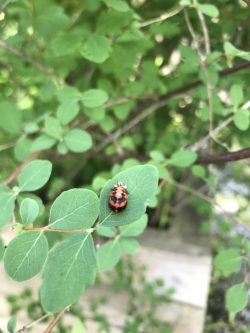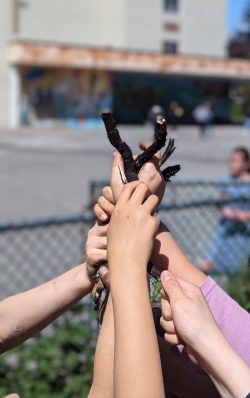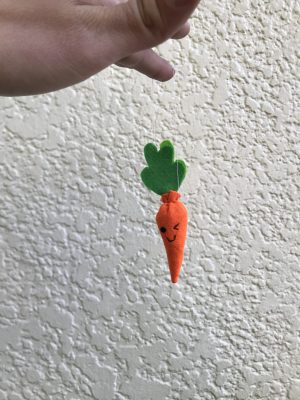Written by Easton Skara, School Gardens Program Assistant.
My 8 week internship as the School Gardens Program Assistant, I was given the time to develop and reflect on my role as both an educator and gardener. During my experience in nature and outdoor learning environments, I gained valuable insights into patience, overcoming fear, and building resilience
Gradual Discovery in the Garden
Gradually, each student came across multiple lady beetle pupae who found their homes on the leaves of an Indian Plum. The joy I found in discovering aphids in the broad beans was reflected by the excitement of students finding the pupae. For students who were less willing to engage, I felt comforted by the fact that nature was patient. Joy was experienced in new findings and developing my own questions at my pace. I felt compelled to not disturb that process for the students.

Overcoming Barriers of Fear
FEAR hindered my ability to engage with the garden. Mainly from insects who might sting, or curious bugs who find a way to crawl up my arm. Childhood experiences left me cautious, however, while spending more time in the garden, I realized that I had a few misconceptions about pollinators. I believed wasps were angry insects who didn’t contribute to the garden. In-fact, I found wasps were easy to be around, and learned that they are beneficial insects. Another misconception was that bees and other pollinators felt threatened by our presence. This is false, as they consistently paid no attention to me. I learned to use a calm presence by observing how the School Gardens Program Coordinator and other volunteers would approach their garden observations. I came to the realization that pollinators were trying to get a job done. As long as I didn’t interrupt their work we could easily co-exist.

Personal Connection and Resiliency
I start to gain a personal connection to the garden the more I spend time there. Getting to know the plants, noticing which specific growing conditions suit them, such as sun exposure, soil health, and watering needs, becomes an essential aspect of the process as it motivates me to better care for them. My background is primarily with working on farms where we grew a variety of crops, and similarly, I found the best course of action when maintaining the school gardens was consistent attention.
I witnessed that most students also found this personal connection to the garden through the School Gardens Program. As the weeks went on, gradually more students became motivated and eager to accomplish the garden tasks. One particular task at an inner city school was removing the tap root of a giant fennel. This garden has an ongoing problem with self-seeding fennel, and this particular plant was so large it took two lessons to remove.
A small group of Grade 4 and 5 students worked together on loosening the root deeply anchored in the soil. Their excitement and determination to remove it from the ground grew. It was encouraging to see students take the initiative and show resiliency with a task they had discovered themselves. I was cheering them on with encouragement. We set a challenge that whoever wedged it free got to take it home. The group accomplishment of pulling the root outweighed the importance of who won the prize. A garden has plenty to offer when we’re given time to explore and discover things that spark our imagination, and it was inspiring to see the students experience that spark and test themselves with a difficult task.

I am enrolled in a post secondary education program this fall that will lead to more learning experiences at elementary and secondary schools. Through my internship with SPEC’s School Gardens Program, I was given the opportunity to develop my skills while building connections with both gardens and students. I’m thankful for these experiences and eager to carry them forward as I continue my work in the field of education.
The SPEC team extends our heartfelt gratitude to Easton for his hard work and dedication. We wish him all the best for a successful and fulfilling future.
